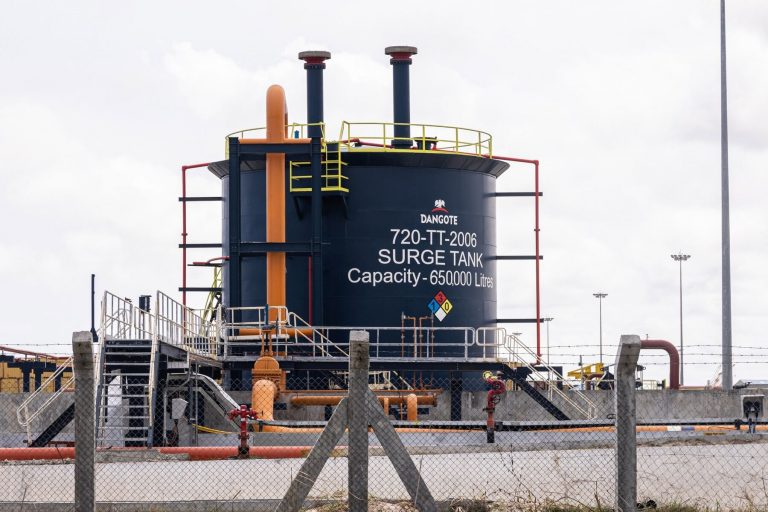
The Vice President of Dangote Industries Limited, Devakumar V.G. Edwin, has voiced his frustration over a boycott of Dangote Refinery’s products by local petroleum marketers, despite the refinery’s capacity to supply affordable petroleum products.
Speaking during a Twitter space hosted by Nairametrics on Wednesday, Edwin revealed that despite the refinery’s efforts to provide cheaper products, local traders continue to favor importing refined products from abroad rather than supporting local refining.
Edwin explained that the core vision behind the Dangote Refinery was to reduce Nigeria’s dependence on imported petroleum products by refining domestic crude oil for the local market. However, this goal has been hampered by the reluctance of local marketers to engage with the refinery.
Tekedia Mini-MBA edition 16 (Feb 10 – May 3, 2025) opens registrations; register today for early bird discounts.
Tekedia AI in Business Masterclass opens registrations here.
Join Tekedia Capital Syndicate and invest in Africa’s finest startups here.
According to him, only about 3% of the refinery’s output is currently sold locally, while the remaining 97%, including diesel and jet fuel, is exported.
“The whole purpose of doing this refinery in Nigeria was to utilize our local crude instead of exporting raw materials and importing finished products,” Edwin stated. “We should be able to refine and use the finished products within Nigeria and produce more to export the surplus.”
Edwin indicated that there may be deliberate attempts by some local marketers to block the Dangote Refinery’s products even though the refinery has reduced prices twice to encourage sales. He noted that marketers continue to resist, even going as far as writing to President Bola Tinubu to complain about the refinery’s pricing strategy, accusing Dangote of undercutting the market.
“They wrote to His Excellency, the president, claiming that we are disturbing the market by dropping our prices,” Edwin said. “We reduced prices to meet market dynamics, but instead of cooperation, they pushed back.”
This resistance has forced the Dangote Refinery to export most of its production, a significant deviation from the refinery’s original goal of supplying the domestic market. Edwin highlighted that the refinery, with a production capacity of up to 54 million liters of refined petroleum products per day, could easily meet Nigeria’s demand, yet local marketers remain hesitant to engage.
Dependence on Imported Crude Oil
One of the other challenges faced by the refinery is inconsistent crude oil supply from local sources. This has forced Dangote Refinery to import crude from countries like the U.S. and Brazil. International oil companies (IOCs), which typically prioritize foreign markets, often sell crude oil at higher prices to local buyers.
Aliko Dangote, Chairman of Dangote Industries, previously announced that the refinery’s operations had already led to a 60% reduction in the local price of diesel. Prior to the refinery’s commencement, diesel sold for approximately N1,700 per liter, but the refinery was able to lower this to around N1,000. Despite the significant depreciation of the Naira, with exchange rates soaring to about N1,500 per dollar, Dangote Refinery has kept diesel prices below N1,200.
Edwin explained that 44% of the refinery’s production capacity could supply 100% of Nigeria’s demand for refined products. Yet the lack of consistent local crude supply, coupled with local marketers’ reluctance to patronize the refinery, means the refinery has had to look internationally for both crude inputs and product exports.
NNPC Wants A Direct Role
Amid these challenges, the Nigerian National Petroleum Corporation (NNPC) has requested a more direct involvement in Dangote Refinery’s operations. According to Edwin, NNPC has asked to permanently station a team of six to ten people at the refinery to oversee crude supply and production processes. The arrangement is part of a crude supply agreement where Dangote Refinery would purchase crude oil from the NNPC in Naira, process it, and sell the refined products back in Naira.
Edwin noted that discussions with the NNPC are still ongoing, with key issues such as crude pricing and the exchange rate for the Naira yet to be finalized. The potential shift from transacting in dollars to conducting business in Naira marks a significant departure from the refinery’s original model, which was designed as a free zone company.
“We are still in talks with the government about receiving crude in Naira,” Edwin said. “Some unresolved issues include the pricing of crude, the pricing mechanism, and determining the appropriate exchange rate for the Naira.”
Impact of Boycott on Nigeria’s Energy Security
The importation of Premium Motor Spirit (PMS) continues to soar, with Nigeria spending N3.22 trillion on petrol imports in the second quarter of 2024 alone, according to data from the National Bureau of Statistics (NBS). This import bill represents a 100% increase compared to the same period in 2023, signaling the ongoing reliance on foreign products despite Dangote Refinery’s ability to meet local demand.
Energy experts have raised concerns over the reluctance of local marketers to support Dangote Refinery, viewing the situation as a deliberate pushback by those benefiting from importing substandard petroleum products into the country. Kelvin Emmanuel, an energy expert, highlighted that some state actors are involved in the conspiracy to block local refining efforts while continuing the importation of lower-quality fuel.
“You see the conspiracy I speak of? These are the people working with state actors to ensure Nigeria doesn’t achieve energy security, while they keep importing ‘dirty’ substandard petrol and diesel that can only be accepted in Nigeria,” Emmanuel stated.
The ongoing importation of substandard products, and a potential boycott of locally refined goods, are a threat to Nigeria’s efforts to achieve energy security and backward integration. Emmanuel explained that international blending plants are under a “take or pay” contract, meaning that the transshipment of substandard fuel into Nigeria will continue until at least the end of 2024.



